Sitting with the Mothers: Getting to Know Macha
Entry #6 - The Queen & Goddess Behind 'Macha, Mighty Mother'
An audio recording is included as an invitation to experience the sacredness held within the voice (and tradition) of oral storytelling. If it resonates, please enjoy at your leisure.
Mo ghrá go léir / All my love,
Erica
‘Sitting with the Mothers’: The Sacred Intention of this Evolving Series
… I am no a scholar. And I approach these shares with no air of expertise.
I come to you as an artist. An intuitive. A seer. I come to you with a desire to honour what can be seen and felt with the Otherworldly eye - and for that reality to be known as more than symptoms of a creative imagination.
I believe the spirit of our Irish mythology and folklore is alive and well. The medicine of their tales ever changing. Ever evolving. Ever offering.
May these shares be a comfort, an inspiration, an illumination, or simply good company, for your journey.
Sitting with the Mothers: Getting to Know the Goddess Brigid
Macha: Goddess and Queen
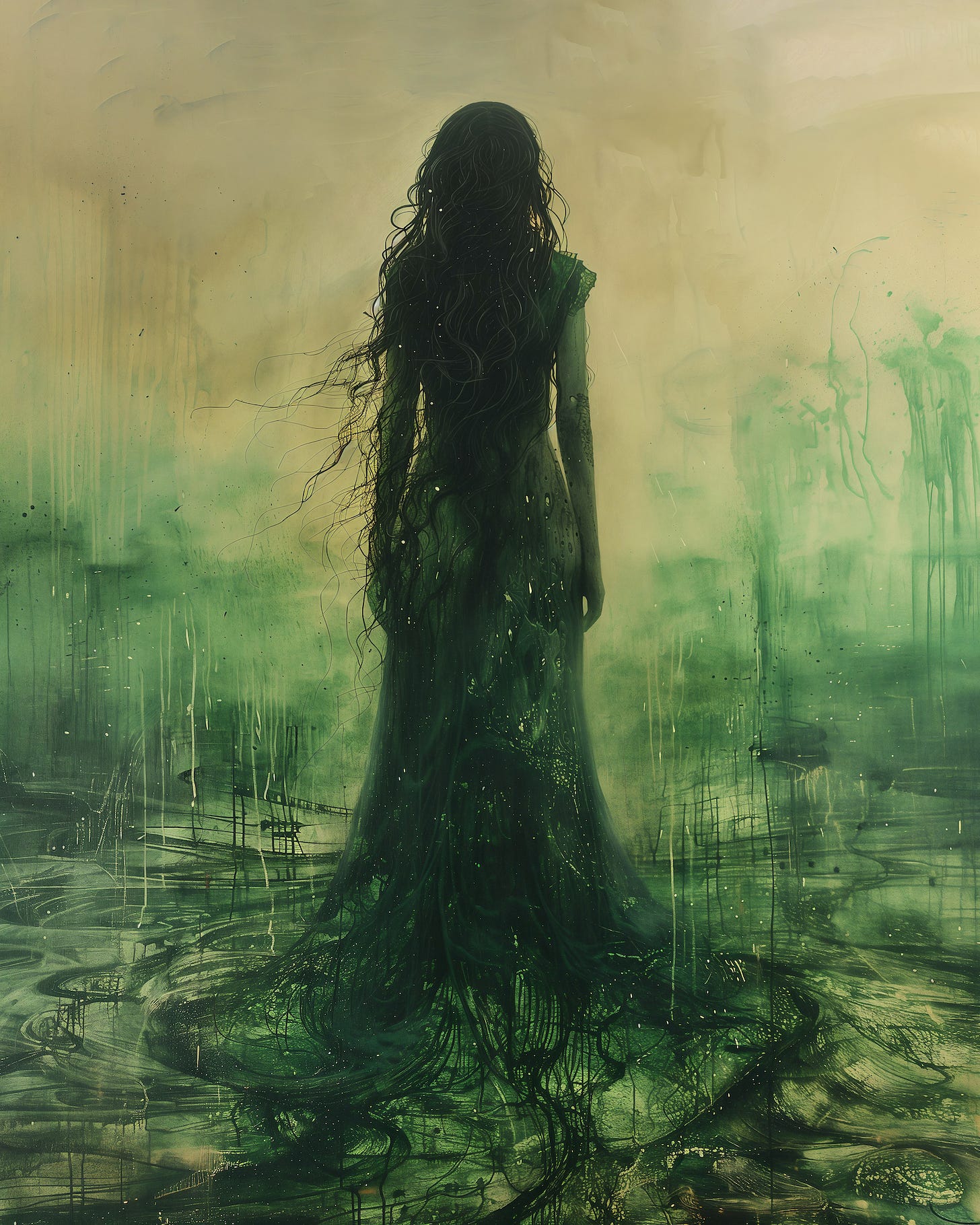
When I first heard the rounded vowels embraced by the resolute consonants of her name, Macha immediately emanated an unshakeable presence.
As with many of Ireland’s great feminine beings, stories of Macha are woven with the dynamic threads of our mythology, folklore, and the land herself.
Her vastness unencumbered by one singular existence.
As goddess, Macha is often associated with sovereignty, motherhood, war, land, magic, and horses. Some know her as one who stands on her own; others know her in the company of three [na Morrigna] - one within The Morrígan.
As a queen, some know her as Macha Mong Ruad - Queen of Ulster.
How ever she known to you, sensed within the physical or Otherworldly realm, her presence is alive and well; her wisdom waiting to be heard by those who seek her.
Macha. Her wisdom rooted deep with the bones of her physical being. Her sovereign heart and spirit, unyielding. She stands as sturdy as the regal broach resting upon her breast.
This is how Macha made her presence known to me - and how her words were then offered to Saoirse in the telling of Stars, Stones, and Shadows: A Heroine’s Tale.
Along my artist’s way, I am learning that the tales of our past can guide our way towards remembering and honouring our present selves. Not by living in the past, but by illuminating an embodied understanding of the mighty power found within our physical body and ethereal spirit.
Macha Mong Ruad: The Queen of Ulster
When considering the queenship of Macha, I feel there are many nuances found within story of The Foundation of the Palace of Emain Macha.
Personally, there are two characteristics of Queen Macha that stand out to me: her unwavering strength and tenacious mind.
It’s said, that in the distant past, the kingship of Ulster was once served between three co-sovereigns within a seven year cycle. Macha Mong Ruad (or Redhaired Macha) was the only child of one the Ultonian king’s. When Macha’s father died, she appointed herself to the thrown during his time of sovereign rule. Now, not only was this unheard of, but after questioning her right to queenship, Macha would go on to defend her right to sovereignty by defeating the remaining two kings in battle - one of whom, Dithorba, died during this time.
Unfazed by the rable-rousing of Dithorba’s remaining sons, Macha remained steadfast in her dutiful role as queen by banishing the men to wilderness of Connacht.
Interestingly, after doing this, (in disguise) she then goes to check on the sons of Dithorba - as told in the following scene:
Macha set out to discover the sons of Dithorba, in the shape of a leprous woman … The men asked news of her, and she told them… A man of them said: "Beautiful is the eye of the hag: let us cohabit with her". He took her with him into the wood. She tied that man by main strength, and she left him in the wood. She came again to the fire. "What of the man who went with you?" said they. "He was ashamed", said she, "to come back to you after cohabiting with a leprous woman". "It is no shame", said they, "for we will all of us do the same". Each man of them took her into the wood. She tied each man of them by her strength, and carried them in one tie with her to Ulster. The Ultonians proposed to have them killed. ‘Not so’, said she, ‘because it would be the defilement of the righteousness of a sovereign to me; but they shall be condemned to slavery, and shall raise a Rath around me, and it shall be the chief city of Ulster for ever.’
O'Curry, Eugene. Lectures on the manuscript materials of ancient Irish history. Dublin: 1861. pp.527-528.
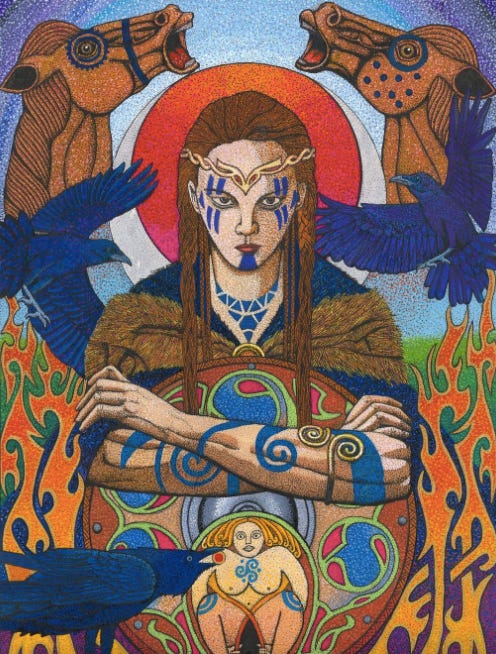
In the end, when she could have heeded the calls for retribution at the cost of their lives, Macha instead chooses a more prolonged and shame-filled existence for Dithorba’s sons - by sentencing them to slavery.
Punishment for their vile actions would be paid with their blood, sweat, and physical autonomy.
So, one might say, Macha not only took her ‘rightful place at the table’. But rather, she took the whole table - with her astute wit, unquestionable strength, and steady determination.
And, as for the men who believed they had the right to take her for their pleasure; well, they would end up building the foundation for the palace of Emain Macha - the very place for which her sovereign table would rest.
The Curse of Macha
I’ve heard many a rendition of The Pangs of Ulster. Each telling offering a different tincture for its listeners - as unique as the tellers themselves.
Shared threads of this tale describe Macha as an Otherworldly (or ‘faery’) woman; married to a wealthy landlord of Ulster.
One day, in the spirit of boastful competition, her husband claims that she can easily out run any of the royal horses. Regardless of (obviously) being heavy with child, Macha is summoned by the king and forced in foot race alongside his greatest chariots. Upon winning the race, she gives birth to twins (of whom are also linked to the landscape of Emain Macha).
It is said that before her death, Macha damns the men of Ulster to feel the pangs of labour when faced with the height of battle.
As an example of the tale, I feel this excerpt from Jennifer Murphy’s telling pays tribute to the story’s mythological roots [setting the stage for the Irish epic Táin Bó Cúailnge]; while also honouring what one might imagine as the heart and emotional landscape of the woman named Macha.
She went to the fair, and her pangs gripped her. She called out to the crowd: ‘A mother bore each one of you! Help me! Wait till my child is born.’ But she couldn’t move them. ‘Very well,’ she said. ‘A long-lasting evil will come out of this on the whole of Ulster.’ ‘What is your name?’ the king said. ‘My name, and the name of my offspring,’ she said, ‘will be given to this place. I am Macha, daughter of Sainrith mac Imbaith’ [possibly means, ‘Strange son of Ocean’]. Then she raced the chariot and outran the horses. As the chariot reached the end of the field, she gave birth alongside it. She bore twins. A son and a daughter. The name Emain Macha, the Twins of Macha, comes from this. As she gave birth she screamed out that all who heard that scream would suffer from the same pangs for five days and four nights in their times of greatest difficulty. This affliction, ever afterward, seized all the men of Ulster who were there that day, and nine generations after them. Five days and four nights, or five nights and four days, the pangs lasted. For nine generations any Ulsterman in those pangs had no more strength than a woman on the bed of labour. Jennifer Murphy. Macha's Curse. Library: The Celtic Creatives [Website].
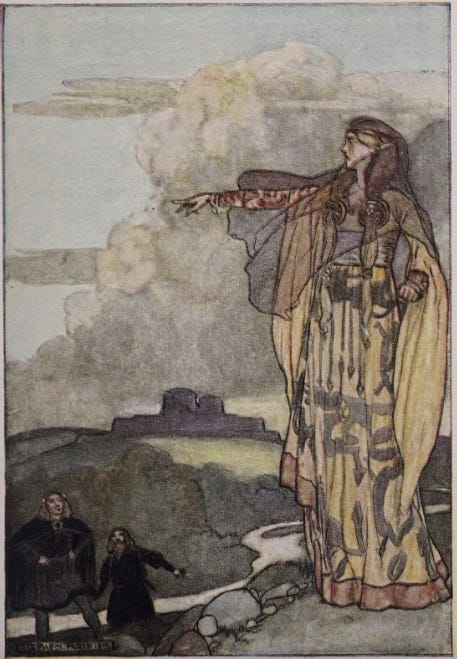
Macha: The Mighty Mother
To me, whether she be goddess or queen, Macha is the embodiment of the sturdy sacred grounds from which all of us are born into this physical world.
Through the mightiness of a mother.
Be wary of Macha. Whether she be questioned, challenged, doubted, or cornered, she will rise. She does not cower. She does not back down. She never wavers or hides.
Each. Time. She. Will. Rise.
Macha, The Mighty Mother, is the rooted, unshakeable, paradoxical force of femininity personified. Made of shadow and light. The great creator and destroyer. Carrying within her all potential - from wrath to grace.
Along my personal journey, Macha continues to be an Otherworldly midwife [bean ghlúine, in Irish] who consistently tends to the waters of my own embodied feminine reckoning and remembering.
Where she offers in steadfast:
Daughter, I can feel the heavy burdens that you carry. Trust the wisdom of your body to guide you through what you’re feeling. You have an incredible power within you. Trust that. Trust the pangs of birth, death, and rebirth. Your body and spirit know how to do this.
You have magic in your blood and bones.
[Macha, The Mighty Mother. An excerpt from Stars, Stones, and Shadows: A Heroine’s Tale. Into the Circle Theatre. 2023]
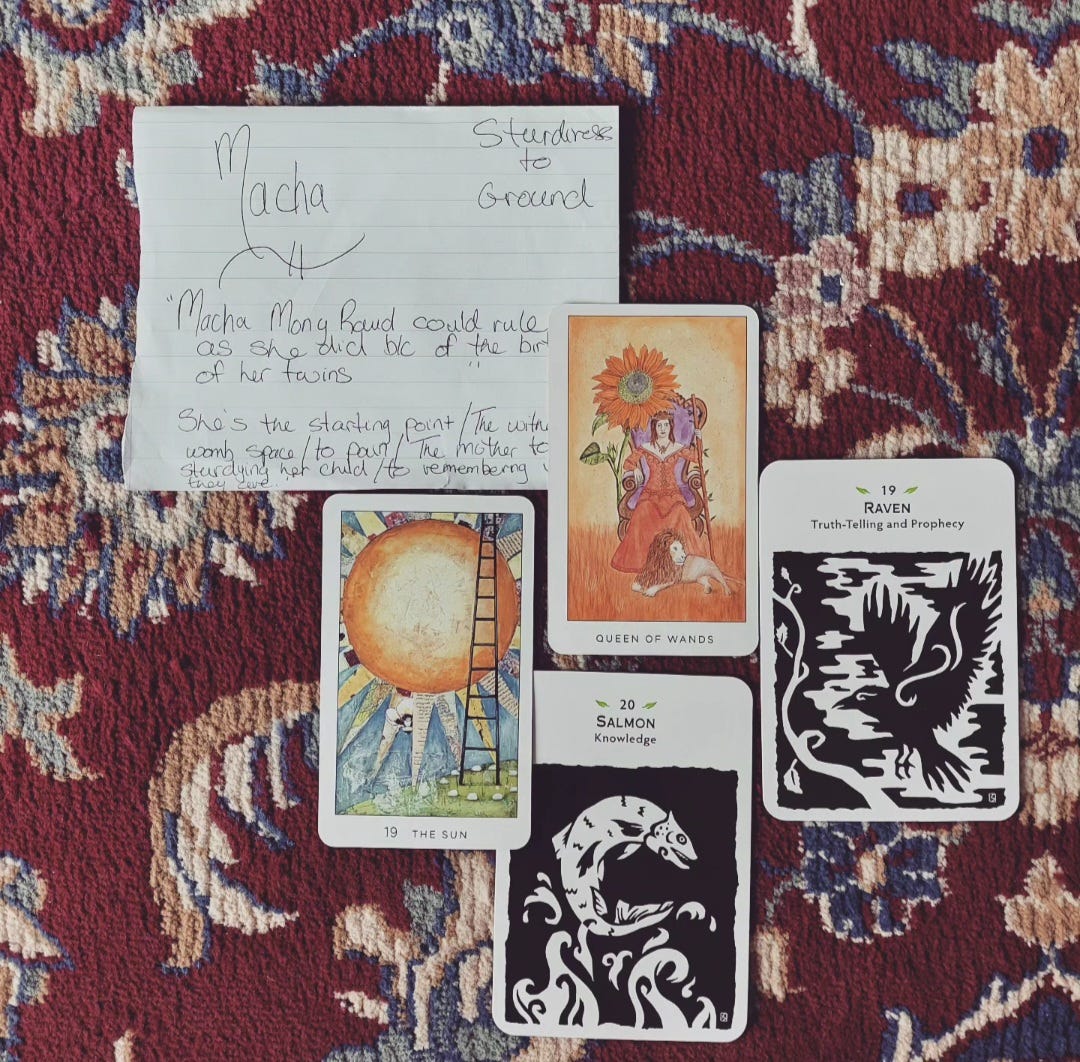
I was one the fence about whether to include this in our current gathering.
But, if there’s interest, I would be happy to share it in an upcoming W&E Entry.
Míle buíochas for letting me know.
I would love for Weavings of the Wise & Embodied to be an opportunity for us to connect in community. A homecoming of souls around the hearth, held within this sacred liminal space.
Please feel most welcome to contribute or share your experience by leaving a comment below.
Was there an element in this entry that resonated most to you?
How do you connect with Macha? As Queen, Goddess, or Mighty Mother?
If you could share in a few moments with Macha, what question(s) might you ask her?
Until we meet in circle again, may grace and ease continue to find you.
Le dea ghuí / With good wishes,
Erica
Interested in a downloadable PDF of additional resources that inspired Entry #6 and ‘Stars, Stones, and Shadows: A Heroine’s Tale’? Click here.
Being of Irish and French ancestry, I continue to be reverently grateful to the traditional spirits and land keepers [past, present, and forth-coming] of the unceded and unsurrendered territory of the Algonquin Anishinabeg People; where I was born and currently reside.
Culture, language, and stories run within the rivers and are held within the stones of landscapes. Míle buíochas, a thousand thanks, for the opportunity to live, create, share stories, and walk alongside you.
Interested in more information on 1:1 supportive offerings or Erica’s approach to sacred storytelling?
Please visit website Into the Circle with Erica O’Reilly for more information.
If the W&E experience resonated with you, invite a friend to journey along with us!


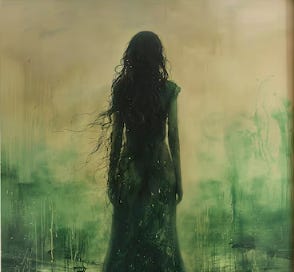












Her bravery and her fierceness! Her unflinching presence.